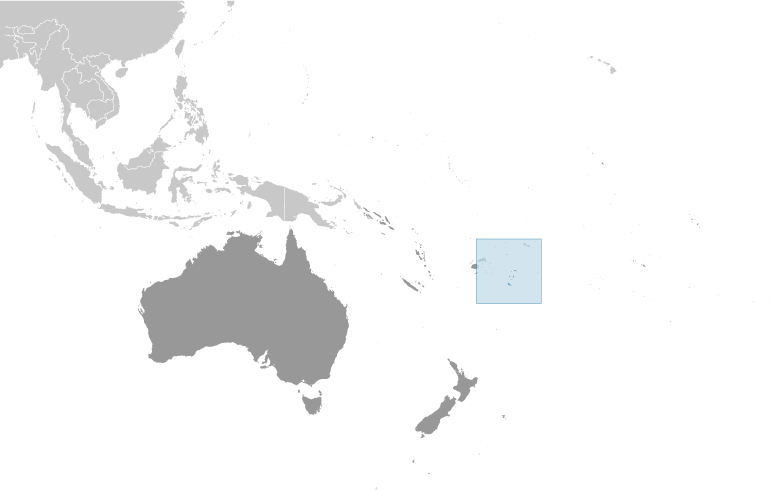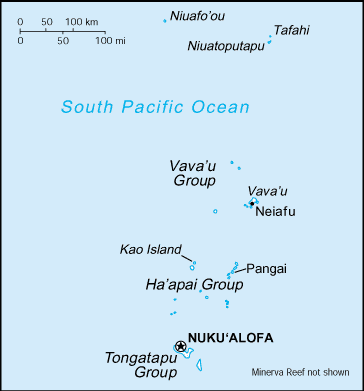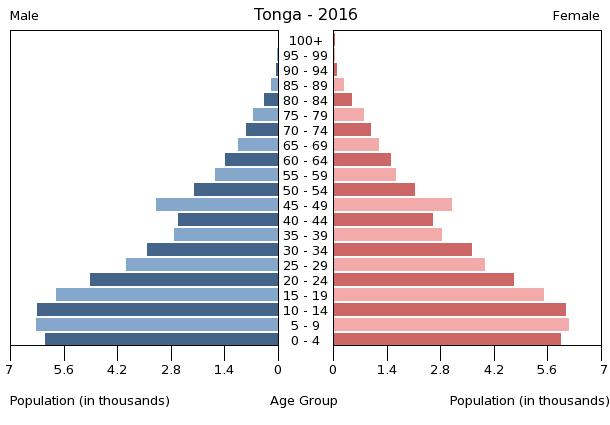Introduction :: TONGA
-
Tonga - unique among Pacific nations - never completely lost its indigenous governance. The archipelagos of "The Friendly Islands" were united into a Polynesian kingdom in 1845. Tonga became a constitutional monarchy in 1875 and a British protectorate in 1900; it withdrew from the protectorate and joined the Commonwealth of Nations in 1970. Tonga remains the only monarchy in the Pacific.
Geography :: TONGA
-
Oceania, archipelago in the South Pacific Ocean, about two-thirds of the way from Hawaii to New Zealand
20 00 S, 175 00 W
Oceania
total: 747 sq km
land: 717 sq km
water: 30 sq km
country comparison to the world: 190
four times the size of Washington, DC
0 km
419 km
territorial sea: 12 nm
exclusive economic zone: 200 nm
continental shelf: 200-m depth or to the depth of exploitation
tropical; modified by trade winds; warm season (December to May), cool season (May to December)
mostly flat islands with limestone bedrock formed from uplifted coral formation; others have limestone overlying volcanic rock
mean elevation: NA
elevation extremes: lowest point: Pacific Ocean 0 m
highest point: unnamed elevation on Kao Island 1,033 m
fish, arable land
agricultural land: 43.1%
arable land 22.2%; permanent crops 15.3%; permanent pasture 5.6%
forest: 12.5%
other: 44.4% (2011 est.)
0 sq km (2012)
cyclones (October to April); earthquakes and volcanic activity on Fonuafo'ou
volcanism: moderate volcanic activity; Fonualei (elev. 180 m) has shown frequent activity in recent years, while Niuafo'ou (elev. 260 m), which last erupted in 1985, has forced evacuations; other historically active volcanoes include Late and Tofua
deforestation results as more and more land is being cleared for agriculture and settlement; some damage to coral reefs from starfish and indiscriminate coral and shell collectors; overhunting threatens native sea turtle populations
party to: Biodiversity, Climate Change, Climate Change-Kyoto Protocol, Desertification, Law of the Sea, Marine Dumping, Marine Life Conservation, Ozone Layer Protection, Ship Pollution
signed, but not ratified: none of the selected agreements
archipelago of 169 islands (36 inhabited)
People and Society :: TONGA
-
106,513 (July 2016 est.)
country comparison to the world: 193
noun: Tongan(s)
adjective: Tongan
Tongan 96.6%, part-Tongan 1.7%, other 1.7%, unspecified 0.03% (2006 est.)
English and Tongan 87%, Tongan (official) 10.7%, English (official) 1.2%, other 1.1%, unspecified 0.03% (2006 est.)
Protestant 64.9% (includes Free Wesleyan Church 37.3%, Free Church of Tonga 11.4%, Church of Tonga 7.2%, Tokaikolo Christian Church 2.6%, Assembly of God 2.3%, Seventh Day Adventist 2.2%, Constitutional Church of Tonga 0.9%, Anglican 0.8% and Full Gospel Church 0.2%), Mormon 16.8%, Roman Catholic 15.6%, other 1.1%, none 0.03%, unspecified 1.7% (2006 est.)
0-14 years: 34.47% (male 18,656/female 18,061)
15-24 years: 19.57% (male 10,671/female 10,169)
25-54 years: 33.92% (male 18,045/female 18,080)
55-64 years: 5.7% (male 3,000/female 3,072)
65 years and over: 6.35% (male 3,064/female 3,695) (2016 est.)
population pyramid:

Australia-Oceania
::TONGA

Population Pyramid
A population pyramid illustrates the age and sex structure of a country's population and may provide insights about political and social stability, as well as economic development. The population is distributed along the horizontal axis, with males shown on the left and females on the right. The male and female populations are broken down into 5-year age groups represented as horizontal bars along the vertical axis, with the youngest age groups at the bottom and the oldest at the top. The shape of the population pyramid gradually evolves over time based on fertility, mortality, and international migration trends.
For additional information, please see the entry for Population pyramid on the Definitions and Notes page under the References tab.
total dependency ratio: 74.3%
youth dependency ratio: 64.1%
elderly dependency ratio: 10.2%
potential support ratio: 9.8% (2015 est.)
total: 22.6 years
male: 22.2 years
female: 23.1 years (2016 est.)
country comparison to the world: 175
-0.01% (2016 est.)
country comparison to the world: 200
22.6 births/1,000 population (2016 est.)
country comparison to the world: 71
4.9 deaths/1,000 population (2016 est.)
country comparison to the world: 194
-17.8 migrant(s)/1,000 population (2016 est.)
country comparison to the world: 220
urban population: 23.7% of total population (2015)
rate of urbanization: 0.71% annual rate of change (2010-15 est.)
NUKU'ALOFA 25,000 (2014)
at birth: 1.03 male(s)/female
0-14 years: 1.03 male(s)/female
15-24 years: 1.05 male(s)/female
25-54 years: 1 male(s)/female
55-64 years: 0.98 male(s)/female
65 years and over: 0.84 male(s)/female
total population: 1.01 male(s)/female (2016 est.)
24.9
note: median age at first birth among women 25-49 (2012 est.)
124 deaths/100,000 live births (2015 est.)
country comparison to the world: 66
total: 11.6 deaths/1,000 live births
male: 12 deaths/1,000 live births
female: 11.2 deaths/1,000 live births (2016 est.)
country comparison to the world: 124
total population: 76.2 years
male: 74.7 years
female: 77.8 years (2016 est.)
country comparison to the world: 90
3.18 children born/woman (2016 est.)
country comparison to the world: 51
5.2% of GDP (2014)
country comparison to the world: 129
0.56 physicians/1,000 population (2010)
2.6 beds/1,000 population (2010)
improved:
urban: 99.7% of population
rural: 99.6% of population
total: 99.6% of population
unimproved:
urban: 0.3% of population
rural: 0.4% of population
total: 0.4% of population (2015 est.)
improved:
urban: 97.6% of population
rural: 89% of population
total: 91% of population
unimproved:
urban: 2.4% of population
rural: 11% of population
total: 9% of population (2015 est.)
NA
NA
NA
note: active local transmission of Zika virus by Aedes species mosquitoes has been identified in this country (as of August 2016); it poses an important risk (a large number of cases possible) among US citizens if bitten by an infective mosquito; other less common ways to get Zika are through sex, via blood transfusion, or during pregnancy, in which the pregnant woman passes Zika virus to her fetus (2016)
41.1% (2014)
country comparison to the world: 5
1.9% (2012)
definition: can read and write Tongan and/or English
total population: 99.4%
male: 99.3%
female: 99.4% (2015 est.)
Government :: TONGA
-
conventional long form: Kingdom of Tonga
conventional short form: Tonga
local long form: Pule'anga Tonga
local short form: Tonga
former: Friendly Islands
etymology: "tonga" means "south" in the Tongan language and refers to the country's geographic position in relation to central Polynesia
constitutional monarchy
name: Nuku'alofa
geographic coordinates: 21 08 S, 175 12 W
time difference: UTC+13 (18 hours ahead of Washington, DC, during Standard Time)
5 island divisions; 'Eua, Ha'apai, Ongo Niua, Tongatapu, Vava'u
4 June 1970 (from UK protectorate)
King's Official Birthday, 4 July (1959); Constitution Day (National Day), 4 November (1875)
adopted 4 November 1875, revised 1988; amended many times, last in 2014 (2016)
English common law
has not submitted an ICJ jurisdiction declaration; non-party state to the ICCt
citizenship by birth: no
citizenship by descent only: the father must be a citizen of Tonga; if a child is born out of wedlock, the mother must be a citizen of Tonga
dual citizenship recognized: yes
residency requirement for naturalization: 5 years
21 years of age; universal
chief of state: King TUPOU VI (since 18 March 2012); note - on 18 March 2012, King George TUPOU V died and his brother, Crown Prince TUPOUTO'A Lavaka, assumed the throne as TUPOU VI
head of government: Prime Minister 'Akilisi POHIVA (since 30 December 2014)
cabinet: Cabinet nominated by the prime minister and appointed by the monarch
elections/appointments: the monarchy is hereditary; prime minister and deputy prime minister indirectly elected by the Legislative Assembly and appointed by the monarch; election last held on 21 December 2010 (next to be held in November 2014)
election results: 'Akilisi POHIVA (Democratic Party of the Friendly Islands) elected prime minister by parliament on 29 December 2014; vote - 15 of 26 votes
note: a Privy Council advises the monarch
description: unicameral Legislative Assembly or Fale Alea (26 seats; 17 people's representatives directly elected in single-seat constituencies by simple majority vote and 9 indirectly elected by hereditary leaders; members serve 3-year terms)
elections: last held on 27 November 2014 (next to be held in 2017)
election results: percent of vote - NA; seats by party - Democratic Party 9, noble's representatives 9, independent 8
highest court(s): Court of Appeal (consists of the court president and a number of judges determined by the monarch); note - appeals beyond the Court of Appeal are brought before the King in Privy Council, the monarch's advisory organ that has both judicial and legislative powers
judge selection and term of office: judge appointments and tenures made by the King in Privy Council, judge appointments subject to consent of the Legislative Assembly
subordinate courts: Supreme Court; Magistrate's Courts; Land Courts
Democratic Party of the Friendly Islands [Samuela 'Akilisi POHIVA]
People's Democratic Party or PDP [Tesina FUKO]
Sustainable Nation-Building Party [Sione FONUA]
Tonga Democratic Labor Party
Tonga Human Rights and Democracy Movement or THRDM
Human Rights and Democracy Movement Tonga or HRDMT [Rev. Simote VEA, chairman]
Public Servant's Association [Finau TUTONE]
ACP, ADB, AOSIS, C, FAO, G-77, IBRD, ICAO, ICRM, IDA, IFAD, IFC, IFRCS, IHO, IMF, IMO, IMSO, Interpol, IOC, IPU, ITU, ITUC (NGOs), OPCW, PIF, Sparteca, SPC, UN, UNCTAD, UNESCO, UNIDO, UPU, WCO, WHO, WIPO, WMO, WTO
chief of mission: Ambassador Mahe'uli'uli Sandhurst TUPOUNIUA (since 10 September 2013)
chancery: 250 E. 51st Street, New York, NY, 10022
telephone: [1] (917) 369-1025
FAX: [1] (917) 369-1024
consulate(s) general: San Francisco
the US does not have an embassy in Tonga; the US Ambassador to Fiji is accredited to Tonga
red with a bold red cross on a white rectangle in the upper hoist-side corner; the cross reflects the deep-rooted Christianity in Tonga; red represents the blood of Christ and his sacrifice; white signifies purity
red cross on white field, arms equal length; national colors: red, white
name: "Ko e fasi `o e tu"i `o e `Otu Tonga" (Song of the King of the Tonga Islands)
lyrics/music: Uelingatoni Ngu TUPOUMALOHI/Karl Gustavus SCHMITT
note: in use since 1875; more commonly known as "Fasi Fakafonua" (National Song)
Economy :: TONGA
-
Tonga has a small, open, island economy and is the last constitutional monarchy among the Pacific Island countries. It has a narrow export base in agricultural goods. Squash, vanilla beans, and yams are the main crops. Agricultural exports, including fish, make up two-thirds of total exports. Tourism is the second-largest source of hard currency earnings following remittances. Tonga had 45,000 visitors in 2013. The country must import a high proportion of its food, mainly from New Zealand.
The country remains dependent on external aid and remittances from overseas Tongans to offset its trade deficit. The government is emphasizing the development of the private sector, encouraging investment, and is committing increased funds for healthcare and education. Tonga's English-speaking and educated workforce offer a viable labor market, and the tropical climate provides fertile soil. Renewable energy and deep sea mining also offer opportunities for investment.
Tonga has a reasonably sound basic infrastructure and well developed social services. The government faces high unemployment among the young, moderate inflation, pressures for democratic reform, and rising civil service expenditures.
$526 million (2015 est.)
$512.6 million (2014 est.)
$502.4 million (2013 est.)
note: data are in 2015 US dollars
country comparison to the world: 213
$414 million (2015 est.)
2.6% (2015 est.)
2% (2014 est.)
-0.6% (2013 est.)
country comparison to the world: 88
$5,100 (2015 est.)
$4,900 (2014 est.)
$4,800 (2013 est.)
note: data are in 2015 US dollars
country comparison to the world: 168
household consumption: 79.8%
government consumption: 20.7%
investment in fixed capital: 38.7%
investment in inventories: 0.1%
exports of goods and services: 16.2%
imports of goods and services: -55.5% (2015 est.)
agriculture: 19.3%
industry: 20.1%
services: 60.6% (2015 est.)
squash, coconuts, copra, bananas, vanilla beans, cocoa, coffee, sweet potatoes, cassava, taro and kava
tourism, construction, fishing
10.9% (2015 est.)
country comparison to the world: 7
33,800 (2011 est.)
country comparison to the world: 201
agriculture: 27.5%
industry: 27.5%
services: 2,006% (2006 est.)
1.1% (2011 est.)
1.1% (2006)
country comparison to the world: 6
24% (FY03/04 est.)
lowest 10%: NA%
highest 10%: NA%
revenues: $94.98 million
expenditures: $94.98 million (2015 est.)
22.9% of GDP (2015 est.)
country comparison to the world: 140
0% of GDP (2015 est.)
country comparison to the world: 38
45.1% of GDP (2013)
46.5% of GDP (2012)
country comparison to the world: 98
1 July - 30 June
-1% (2015 est.)
2.5% (2014 est.)
country comparison to the world: 42
8.09% (31 December 2015 est.)
8.89% (31 December 2014 est.)
country comparison to the world: 104
$101.8 million (31 December 2015 est.)
$95.17 million (31 December 2014 est.)
country comparison to the world: 186
$198.4 million (31 December 2014 est.)
$195.1 million (31 December 2013 est.)
country comparison to the world: 190
$128.4 million (31 December 2015 est.)
$121.2 million (31 December 2014 est.)
country comparison to the world: 183
$NA
-$32 million (2015 est.)
-$37 million (2014 est.)
country comparison to the world: 60
$30.6 million (2015 est.)
$31 million (2014 est.)
country comparison to the world: 207
squash, fish, vanilla beans, root crops
Japan 16%, US 15.4%, Fiji 12.8%, NZ 12.5%, South Korea 11%, Samoa 10.7%, Australia 7.5%, American Samoa 6.8% (2015)
$263 million (2015 est.)
$240.1 million (2014 est.)
country comparison to the world: 202
foodstuffs, machinery and transport equipment, fuels, chemicals
Fiji 37.7%, NZ 21.2%, China 14.2%, US 6.4%, Australia 4.5% (2015)
$156.1 million (31 December 2015 est.)
$158.8 million (31 December 2014 est.)
country comparison to the world: 162
$206.2 million (31 December 2015 est.)
$196.3 million (31 December 2014 est.)
country comparison to the world: 188
$110.2 million (31 December 2015 est.)
$107.2 million (31 December 2014 est.)
country comparison to the world: 118
pa'anga (TOP) per US dollar -
2.1058 (2015 est.)
1.847 (2014 est.)
1.847 (2013 est.)
1.72 (2012 est.)
1.729 (2011 est.)
Energy :: TONGA
-
population without electricity: 5,325
electrification - total population: 96%
electrification - urban areas: 100%
electrification - rural areas: 83% (2012)
50 million kWh (2014 est.)
country comparison to the world: 208
46.5 million kWh (2014 est.)
country comparison to the world: 207
0 kWh (2013)
country comparison to the world: 203
0 kWh (2013 est.)
country comparison to the world: 208
17,000 kW (2014 est.)
country comparison to the world: 206
100% of total installed capacity (2012 est.)
country comparison to the world: 30
0% of total installed capacity (2012 est.)
country comparison to the world: 190
0% of total installed capacity (2012 est.)
country comparison to the world: 207
0% of total installed capacity (2012 est.)
country comparison to the world: 132
0 bbl/day (2015 est.)
country comparison to the world: 197
0 bbl/day (2013 est.)
country comparison to the world: 196
0 bbl/day (2013 est.)
country comparison to the world: 133
0 bbl (1 January 2010 es)
country comparison to the world: 198
0 bbl/day (2013 est.)
country comparison to the world: 135
1,500 bbl/day (2014 est.)
country comparison to the world: 198
0 bbl/day (2013 est.)
country comparison to the world: 136
1,457 bbl/day (2013 est.)
country comparison to the world: 193
0 cu m (2013 est.)
country comparison to the world: 135
0 cu m (2013 est.)
country comparison to the world: 199
0 cu m (2013 est.)
country comparison to the world: 192
0 cu m (2013 est.)
country comparison to the world: 140
0 cu m (1 January 2014 es)
country comparison to the world: 199
200,000 Mt (2013 est.)
country comparison to the world: 197
Communications :: TONGA
-
total subscriptions: 13,220
subscriptions per 100 inhabitants: 12 (July 2015 est.)
country comparison to the world: 195
total: 70,000
subscriptions per 100 inhabitants: 66 (July 2015 est.)
country comparison to the world: 197
general assessment: competition between Tonga Telecommunications Corporation (TCC) and Digicel Tonga Limited is accelerating expansion of telecommunications; both parties provide high speed Internet, mobile telephone networks, and international telecom services; Digicel also holds a telecommunication license after its acquisition of TonFon (a subsidiary of former Shoreline Communications Tonga); submarine cable infrastructure, managed by Tonga Cable Limited, has also been brought to the country by Asian Development Bank and World Bank aid
domestic: combined fixed-line and mobile-cellular teledensity about 80 telephones per 100 persons; fully automatic switched network
international: country code - 676; satellite earth station - 1 Intelsat (Pacific Ocean) (2015)
1 state-owned TV station and 3 privately owned TV stations; satellite and cable TV services are available; 1 state-owned and 3 privately owned radio stations; Radio Australia broadcasts available via satellite (2015)
.to
total: 48,000
percent of population: 45% (July 2015 est.)
country comparison to the world: 191
Transportation :: TONGA
-
number of registered air carriers: 1
inventory of registered aircraft operated by air carriers: 1
annual passenger traffic on registered air carriers: 75,416
annual freight traffic on registered air carriers: 0 mt-km (2015)
A3 (2016)
6 (2013)
country comparison to the world: 177
total: 1
2,438 to 3,047 m: 1 (2013)
total: 5
1,524 to 2,437 m: 1
914 to 1,523 m: 3
under 914 m: 1 (2013)
total: 680 km
paved: 184 km
unpaved: 496 km (2011)
country comparison to the world: 190
total: 7
by type: cargo 4, carrier 1, passenger/cargo 2
foreign-owned: 2 (Australia 1, UK 1) (2010)
country comparison to the world: 122
major seaport(s): Nuku'alofa, Neiafu, Pangai
Military and Security :: TONGA
-
Tonga Defense Services (TDS): Land Force (Royal Guard), Maritime Force (includes Royal Marines, Air Wing) (2013)
16 years of age for voluntary enlistment (with parental consent); no conscription; the king retains the right to call up "all those capable of bearing arms" in wartime (2012)
Transnational Issues :: TONGA
-
none
















